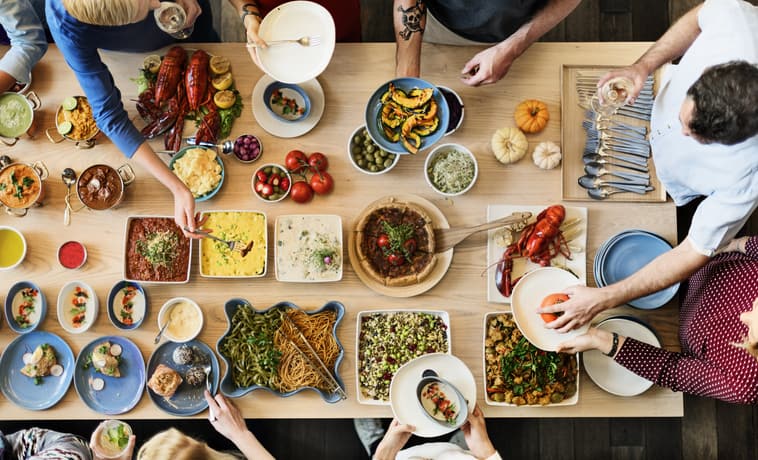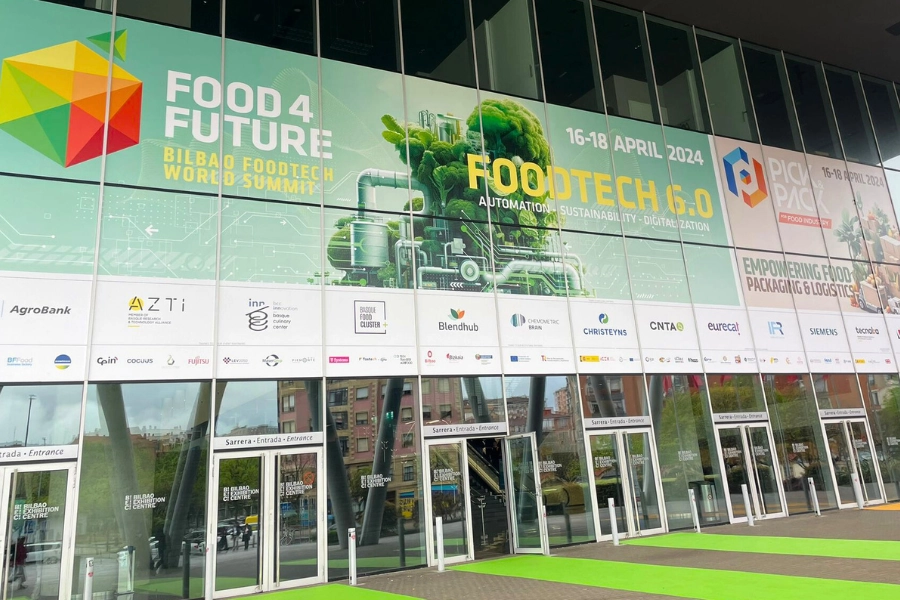8 Barriers to Trying a Plant-Based Diet

Food is not only essential for our survival, but also embedded in our social and cultural interactions. As we slowly start to realise the connection between the foods we eat and the health of our environment, our communities, and ourselves, whole movements dedicated to a more sustainable way of eating are gaining momentum. The Slow Food movement for example maintains that wise personal food choices and awareness of how food is produced, together with other movements like the slow travel lifestyle, can help slow climate change.
But for all of us, food is at risk. Global challenges such as food shortages – triggered by climate emergency impacts such as heatwaves and drought, together with societal emergencies such as the war in Ukraine – pose a threat to our food security, plus food-related greenhouse gas emissions themselves pose a threat to environmental sustainability. And according to UNEP, effective and sustainable solutions for feeding around 10 billion people in 2050 need to be found.
As consumers, we play a vital role in “orienting production” through the ways we buy, transport, cook, and consume our food. Scientists have argued that to tackle food shortages, the consumption of red meat should be halved, and more food will have to be produced on less land. Research suggests that by switching to diets that are largely plant-based, the food sector’s greenhouse gas emissions could decrease by 70% by 2050, and food shortages could also reduce.
An increase in social media activism and awareness has led to a rise in health, environmental, and animal welfare consciousness. As a result, an interest in vegan and/or vegetarian diets is also on the rise. But despite this, red meat consumption in the UK has increased by 18% over the past year. And while many people have pledged to remove meat from their diets by the end of 2020, only 9% stuck to that resolution. This is a “sustainability paradox”, where unsustainable food consumption continues despite awareness of food sustainability issues.
Here, we round up some of the social, cultural and political barriers that might be stopping you from starting or continuing your plant-based journey and offer some ideas and solutions to help you on your way.
1. Cultural and religious values have an impact on our dietary choices
Food is an important part of expressing an individual’s relationship with his/her culture, with every culture having its own distinctive range of food dishes that represent unique customs. Cultural influences can also include following rules for specific food stuffs, and culture and religion are often intertwined, with religious beliefs heavily influencing our diet. For example, Orthodox Judaism encourages the preparation of animal foods for “spiritual health”, while Buddhism, Jainism and Hinduism encourage vegetarianism in the belief of non-violence. In the UK, it’s traditional to eat turkey at Christmas, while in the US, it’s traditional to eat it at Thanksgiving – cultural, sentimental values that can be hard to say goodbye to as they’re associated with memory and family.
Solution: perhaps you can’t persuade Grandma to give up the Christmas turkey, but you could roast potatoes in olive oil instead of goose fat and try a plant-based version of pigs in blankets. Even small, step-by-step changes can have big impact, and if the potatoes and plant-based pigs are a hit, perhaps the next year you might have more luck in switching from turkey to nut roast.
2. Health is hugely significant in choosing what to eat
A significant recent increase in health consciousness has led to people to making changes in their diets to address weight or nutrient deficiencies. Of multiple approaches to changing a diet to improve health, two stand out. Firstly, reducing meat and adding more vegetarian and/or vegan meals to reduce fat and cholesterol intake, and increase consumption of nutrients. But the other takes the opposite approach: incorporating more meat, fish, and dairy products to increase calcium and protein. Pre-existing health conditions such as lactose intolerance and other allergies, or a need to reduce fibre and roughage and increase protein, can also play a part.
Solution: if you don’t have underlying health issues, allergies or doctor’s orders to follow, why not try a vegetarian diet for a week – deriving protein from eggs and calcium from beans, peas and lentils. You’d be surprised just how nutrient-rich non-dairy ingredients can be.
3. Location and accessibility can make sustaining plant-based diets difficult
Dietary choices aren’t always a choice: sometimes it’s about which ingredients and products are readily and affordably available. Plant-based products are more readily available in some areas – and difficulty in sourcing food makes sustaining a plant-based diet difficult. For example, the UK is more vegan-friendly compared to France, while within the UK, finding vegan and vegetarian options is easier in bigger cities such as London, Bristol, and Brighton compared to smaller towns or towns whose economies were traditionally based around the meat trade.
Solution: Supermarkets are gradually introducing more vegan and vegetarian options, and many also have separate vegan and vegetarian sections. Some brands to keep a lookout for include Beyond Meat, Heura, Linda McCartney Foods, and Quorn.
4. The rising cost of living impacts what you choose to eat
Income and freedom of choice go hand in hand. You can only make the conscious choice to shift from a meat and dairy-based diet to a plant-based diet if you can comfortably make the switch. The UK’s food poverty rate is among the highest in Europe, and this got worse during the pandemic, with reliance on food banks increasing rapidly. According to The Big Issue, the Trussell Trust distributed 2.1 million emergency food parcels between April 2021 and March 2022, a 14% increase compared to the previous year.
Solution: If you donate food to a food bank, ask them what food items they need and don’t need. This will not only adhere to the food banks’ preferences but will also help in reducing food waste.
5. Taste and preference influence dietary choices
The taste of food has emotional significance: it’s intimately connected to memory. If the flavour of meat or dairy-based meals conjures happy memories, you may be discouraged from switching to the plant-based substitute. Ice cream can recall sunny childhood days on the beach, charred sausages may suggest Bonfire Night fireworks, and chocolate can conjure everything from Easter egg hunts to birthday cake.
Solution: Try experimenting with different substitutes to see which ones hit the spot. This would help reset your emotional wiring, and you can still enjoy your favourite dishes made with plant-based substitutes! You could start with trying the vegan version your favourite ice cream flavour.
6. Maintaining a plant-based diet may seem like more effort than your usual choices
Dietary choices depend on cooking skills and the time and energy people can devote to their diets. If you’re used to a traditional “meat and potatoes” diet, it can be difficult to make the switch to a plant-based diet because it involves some extra time and energy to learn how to cook something new.
Solution: Follow food bloggers and plant-based influencers on social media who consistently share easy and delicious vegan and vegetarian recipes, to make the transition fun and easy! Examples include: Riverford, Tinned Tomatoes, The Veg Space, and My New Roots
7. Plant-based diets have a certain reputation…
Food is social – we gather and eat. But what we eat, weirdly, can impact people’s perceptions of us. And there’s a strong negative social perception of vegans and vegetarians that might be discouraging you from adopting a plant-based diet, out of fear of what people will say. Media plays a part, with meat-eating treated as “normal” while vegans are presented as “abnormal”, “oversensitive”, and “physically weak”. And, while vegans can be motivated by health or environmental reasons, they are often equated with activism, which can lead to people assuming saying they are “outspoken” and “bigoted”.
Solution: Although it is still relatively difficult to be a vegan or vegetarian, the severity of the difficulty seems to be reducing with time; with more vegans and vegetarians showing persistence and leading by example and making the world more accepting of plant-based diets, one person, restaurant, and supermarket at a time.
Environment and food influencers and educators such as Isias Hernandez are also raising positive awareness using scientific facts and research and transforming the narrative of plant-based activism.
8. Who you live with can help or hinder pursuing a plant-based diet
Research has highlighted the importance of family eating habits in maintaining a plant-based diet: veganism or vegetarianism may be frowned upon by family members, whether that’s due to nutritional concerns or the perceived extra effort involved. Making the dietary switch can be particularly difficult among the young who still live at home and whose families can control/decide what they eat. When you have the freedom to plan, shop for and prepare your own meals, you’re more likely to be able to switch to a plant-based diet and sustain it.
Solution: Try and be as flexible as possible. For example, if you still live with your family and/or do not prepare your own meals, for starters, you could choose vegan and vegetarian options when you eat out. Another option would be communicating your motive behind switching to a plant-based diet to your family or partner and coming to an agreement where some meals in the week could be meat and/or dairy free.
To make the food system more sustainable without compromising on personal preferences and flavour, food innovators are working towards a range of solutions such as lab-grown meat, vertical farming, plant-based meat, and minimising food waste. Find out more here: Top 4 Game Changers in the food system
Learn more about plant-based diets: BBC Good Food, The Vegan Society, Vegetarian Society
For more on food innovation, take a look at: Menu for Change: Amplifying young voices in food systems transformation
We’re here to make a difference
If you are too, then drop us a line.
Get in touch


